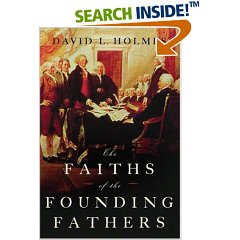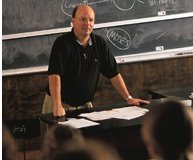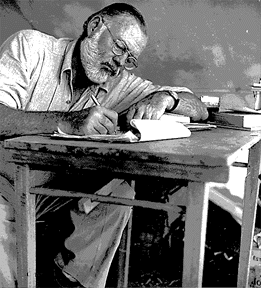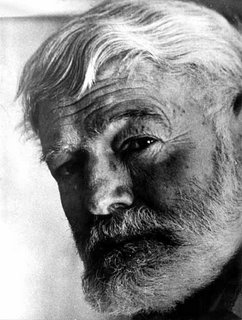Jesus The Radical Pastor
Exploring the life and mission of the very human Jesus of 1st century Jewish culture and the implications for what it means to us who claim to be his followers, his church, his continuing presence in the world.
Wednesday, August 30, 2006
Tuesday, August 29, 2006
Welcome, Sylvia Diane Schwedler!


WELCOME, SYLVIA DIANE SCHWEDLER!
Our newest granddaughter was born at 11:49 p.m. August 28, 2006.
She weighed 8 lbs. 4 oz. and was 19" long.
Her mother, Leah, is recovering well and Andy, her dad, is already adoring her.
We, John and Julie, the grandparents, being veterans, are only EXTREMELY ECSTATIC about her arrival, but what do you expect.
Julie is holding Sylvia for the first time (picture) and Sylvia is thinking in the other picture, "I know I am adorable."
Monday, August 28, 2006
Inerrancy is a Curious Thing
Believe it or not I am one who still believes in inerrancy. This may be a shock to a few who think, for whatever oddball reasons, that I don't.
However, inerrancy is a curious thing to me. I come at it basically from a flow of logic about the perfections of God. God is without error in his very Being. "God breathed out" all scripture (πασα γραφη θεοπνευστος) 2 Timothy 3:16. Unless God has bad breath, "all the writings" breathed out by God were also without error. Viola! Inerrant writings, but with this strong caveat--inerrant only in the original autographs. What "original autographs" means is that the only writings that were ever inerrant were the writings composed by the actual biblical authors themselves, guys like Moses, Isaiah, David, Mark, Paul, John, etc.
Now here is the most curious thing. To the knowledge of all biblical scholars past and present, none of the "original writings" have survived. Technically they are not "extant." They're all gone. Disappeared. Nada. All we have today are copies of copies of copies of the biblical manuscripts. Inerrancy does not apply to these oodles of copies. As a matter of fact these copies of copies are notorious for being errant...with error.
Not to fear, though, because no doctrine/teaching/belief/theological conclusion is jeopardized by these scribal errors in the copies of hand-written scrolls.* Yet, if that's true, then why are there so many different, even opposing views about major doctrines and teachings and theological conclusions? Good question. I think the answer is that all doctrinal statements and theological conclusions are human creations. The doctrine of sin says we are all errant. No Midas touch exists. Humans mess with the Bible like they mess with everything else like uranium. What's a camel? A horse made by a committee.
So, I do believe in inerrancy, but my belief, sadly, does not apply to anything available...not to my NIV, my TNIV, my NASB, my MESSAGE Bible, my NLT, any variations of my KJV and for crying out loud, the Catholic Bible has 12 extra books not in my Protestant Bibles! Inerrancy doesn't apply to the writings of the Didache, Clement, Tertullian, Augustine, Athanasius, Luther, Calvin, Wesley, Edwards, Van Til, Scofield, Warfield, Chafer, Ryrie, Grudem, D.A. Carson, Osteen, Lucado, Willard, Ortberg, Fee, Dan Brown, McKnight, McArthur, Stott, NT Wright, and even Bill O'Reilly.
So I hold on to belief in inerrancy out of deference to an inerrant God. I don't place my faith in the Bible. I place my faith in the Trinitarian God--Father, Son, and Spirit who conspired to reveal God's character, ways and will through a community of (errant) people for a community of errant people in a book called the Bible. This Bible promises that we may live new, but not inerrant lives in the midst of this world infested with trivial to ever more tragic errors. And we live in hope that when "the Perfect" is made known, errancy will be no more.
*To see some of the biblical Dead Sea Scrolls, click here.
Sunday, August 27, 2006
Entering Interim Ministry with "the Covenant"
Today I was installed as the interim pastor of Fellowship Evangelical Covenant Church, Hudsonville, MI.
This assignment is interim (perhaps 8 to 10 months) and part time (20 hours per week).
The Evangelical Covenant Church is a highly active church-planting denomination and I have become acquainted with numerous E.C.C. pastors and denominational leaders. I admire the support that the E.C.C. gives to their church-planting teams and their pastoral teams.
My ministry to young leaders in Ukraine is still operational (I leave for Ukraine on September 15 and return September 28) and affirmed by Fellowship Church and the regional E.C.C. leaders.
I invite you to pray for Julie and me as we launch into this venture of ministry. I will write about the ministry at Fellowship Church from time to time on this blog.
Wednesday, August 23, 2006
August 23, 1969 and now 2006
Tuesday, August 22, 2006
JESUS AND JAZZ

Have you ever visited Jazz Theologian's website?
He has some provocative comments and observations.
My question is: If Jesus were alive today in his first incarnation (as he was in Galilee and Judea), what kind of music would Jesus listen to?
Jazz Theo has convinced me that Jesus would be deeply into jazz.
Jazz is a language, not just a music style. It's a langauge of pain and hope; of darkness and light; of people refusing to give up or give in to the powers that be. Jazz is promise.
Jazz Theo likes to use jazz as a metaphor for the Christian faith. He wrote...
"Classical faith gives you a world view."
"Jazz faith gives you a way of viewing the world."
Thanks, Jazz Theologian.
I think Jesus came into a world of classical faith. This is THE music of life, he was told. Sing it like this and only like this. And I think Jesus introduced "jazz faith." And down-and-out people said, "He's talkin' my talk. He livin' my life. I like his song. I like his music."
W.M.W.J.L.? The answer? JAZZ.
[the picture above is from Calvin College's Jazz Vesper's CD cover titled "Jazz Psalms"]
Friday, August 18, 2006
EMPTY NEST: August 18, 2006.




Julie and I have four wonderful daughters (birth order): Leah, Elisha, Lori and Shamar.
The pictures above are Shamar, our youngest. The one whom, I would wager her sisters saying, had it the best at home. The first 3 were 2 years apart and 4 years later Shamar arrived.
Today Shamar moved out into her own apartment (picture standing in apartment door).
Shamar is a Hebrew verb which means "he watches over, he guards, he protects" (read Psalm 121 for multiple uses of the verb), often referring to God's care.
When Shamar was little, I made up "a-time-to-go-to sleep" song (sing with an Israeli tempo):
"Shamar, Shamar, our God watches over us;
Shamar, Shamar, He watches day and night.
Shamar, Shamar, our God watches over us,
Wwwiiiiiiitthhh His power and His might, cha, cha, cha!"
Now I am having mixed feelings as I let you know that she is an independent young lady. Julie and I sat and ate our home-grilled hamburger and cantaloupe tonight. Just the two of us at a simple meal that was transitioning us into a new phase of life.
Can you spell e-m-p-t-y n-e-s-t?
Shamar graduated in May this year from Grand Valley State University with a degree in "Hospitality Management" (blue cap and gown). In the top picture above she is in her hotel uniform, pretending like she's an airline stewardess letting us know where the exits are on the plane... because that's how she felt she looked in her outfit.
She's got a great guy hanging around her a lot named Evan (see the two above). He's a student at Cornerstone University and because we (Evan and I) like to talk theology and N.T. Wright and Scot McKnight and Jesus studies, Shamar accuses Evan of liking me more than her. Which I really doubt is the case!
Each of our daughters is a delightful, gifted person. From the same parents, but each one of them is a unique young woman in her own right. We love each one of them.
God bless you, Shamar. Know that all of us---Julie and I, Leah and her family, Elisha and her family, and Lori love you very, very much.
So, when are you coming home for dinner??
Thursday, August 17, 2006
Review: Embracing Grace Final Part

I will provide brief snippets from a few chapters, hoping that your appetite will be whetted to get your own copy of Scot McKnight's Embracing Grace: A Gospel for All of Us.
Chapter 3- The Story of the Eikon
Scot introduces a technical, yet fascinating term perichoresis. It is a theological term describing the interrelationships within the Trinity. Scot writes, "The doctrine of the perichoresis teaches that God exists as an interpenetrating and mutual indwelling of the persons of the Trinity. In other words, God's reality is the love between Father, Son, and Spirit. This what God was doing, is doing now, and will do for eternity. This is what God is. Eikons are an expression of that reality and designed for that reality only."
"Individualism wrecks the gospel."
Chapter 4- Cracked Eikons
"[The human condition] will include stories of both Mister Rogers and child abusers, both Mother Teresa and heartless exploiters, both of Billy Graham and disgraced televangelists, both ordinary good folk and ordinary bad folk."
All the glory of being Eikons faded the day Adam and Eve disobeyed God--did not love him and trust his word. All the dimensions of Eikonic glory were broken---broken relationship to God, broken internally (shame, fear), broken relationally, and broken from the good earth God had made for them.
The cracks in the Eikons are relational. The gospel addresses these cracked relationships.
Chapters 5-6. Summary: Eikons are created for community, the community lost in the rebellion, and God is about restoring that community-reality through the gospel.
The remaining chapters of Embracing Grace unfold the forceful missional, strong embracing nature of the gospel of the kingdom of God; a kingdom of embracing grace. The preeminent human Eikon came to the planet in the Person of Jesus Christ. Jesus made known, at great risk to himself, the dancing grace and love of Father, Son, and Spirit and invited cracked Eikons to join in the eternal dance of God.
Grace is powerfully inclusive and overcomes the shameful exclusions that so much defined human relationships in Jesus' time and that sadly continue in a world where things are "not the way it's supposed to be."
I can't urge you enough to get Scot's book, Embracing Grace: A Gospel for All of Us, and savor it page by page.
Wednesday, August 16, 2006
WERE OUR FOUNDING FATHERS GOOD, EVANGELICAL CHRISTIANS?

I didn't know about this book.
Ben Witherington has a review of David L. Holmes' book
The Faiths of Our Founding Fathers (picture on the right is from Amazon.com).
You can read Ben Witherington's review here. Be sure to read the "comments," too. You will get involved in quite a virtual conversation.
Review: Embracing Grace Part 3
EIKON if YUKON (a little humor there)
Chapter 2-- The Beginning of the Gospel
McKnight affirms that if we're to get the gospel right, we have to begin at the beginning. Thus, Chapter 2 sweeps us back to Genesis 1:1 and into the creation story.
Because the concept of "the image of God" is vital to the gospel, McKnight introduces the phrase Eikon of God. Adam and Eve were "Eikons." Eikon is the Greek term for the Hebrew tselem which means "image." Scot does this because the phrase "image of God" has been over-used and diluted in eons of theological debate.
"When God made humans [Eikons of God], he gave them hearts, souls, minds, bodies, and wills to make them individuals; God gave them other individuals just like themselves so they could live in community; and he gave them a world in which to live. ... The gospel is about every one of these dimensions of human life--the human's relationship to herself and himself, to God, to others, and to the world and to the society in which we live."
It's a Beautiful Day in the Neighborhood:
The Life of "Fat Freddy Rogers"
After a brief overview of a fat, lonely kid named Fred Rogers, who went to seminary and then founded the kids' TV show "Mr. Rogers' Neighborhood," Scot notes, "Mr. Rogers, so I believe, gave a generation or two of kids a profound sense of their specialness, their Eikonic status, and showed that we were made to live out this life in our neighborhood."
INDIVIDUALISM IS THE BIGGEST OBSTACLE
TO THE GOSPEL OF EMBRACING GRACE
Why? Because individualism excludes from the discussion of the gospel our relationship to God and to others, leaving us on our own to determine who we are.
Eikons Are Made to Embrace
We're designed to relate: to relate to God, to others, and to our world.
Scot McKinght closes Chapter 2 with this: "Humans are by nature Eikons: that is who we are. By nature, we are designed with the inalienable right to be embraced and to embrace: embracing God who made us and embracing ourselves, embracing others, and embracing our world."
"The gospel that tells our story begins with this beginning."
Tuesday, August 15, 2006
Review: Embracing Grace Part 2

We continue to think with Scot McKnight about "what is the gospel?" as he writes Embracing Grace: A Gospel for All of Us.
Chapter 1 opens "The gospel is more like a piece of music to be performed than a list of ideas to endorse. ...Thus, it is a gospel that is both proclaimed and performed."
A Story to Perform
"...[W]hen the gospel is embodied it tells the gospel story better than anything Hollywood can flash on the screen and better than any novelist can put on paper. ... We don't want to be told that the gospel all of a sudden will solve all our problems and make the world shine its happy face on us...because we know it isn't true."
The gospel is neither "glitzy" nor "tame."
It doesn't erase all problems.
It's not about "being nice to one another" and all will be well.
The gospel is not about being phony and pretending to be perfect. It doesn't create walls that separate people, but invites "everyone to come to the table and listen to Jesus." In a "come-as-you-are-culture," people are looking for an authentic gospel with permeable walls.
"A stronger way of saying it is this: this generation is challenging the Church to perform what it proclaims, or, to use a less elegant phrase, to put up or shut up."
Scot recounts the "performance" of Patrick of Ireland, tells the story of NorhtBridge Church in Illinois near the Wisconsin state line, and affirms Solomon's Porch in Minneapolis.
Chapter 1 ends with "Proclamation and performance of an authentic gospel combine into credibility."
...next: the beginning of the gospel...
Monday, August 14, 2006
Review: Embracing Grace Part 1

What is the gospel?
Scot McKnight's Embracing Grace: A Gospel for All of Us is a readable and enjoyable advance in our understanding of "the gospel of the kingdom of God" announced and lived by Jesus.
I think it answers many questions raised in conversations today, a primary question being "What is the gospel"?
To keep us from reducing "the gospel" down to expressions that fall so short of the expansive grace of God revealed in Jesus Christ, McKnight gives us a compelling book, not a marketing pamphlet; a theology, not a ticket out of hell.
So, who is this Scot McKnight?
Scot is a baseball fanatic, one could say, since his son Lukas is a scout for the Chicago Cubs. He's happily married to Kris who, by the way Scot writes about her, is his favorite companion and travel friend. He's a chef who can prepare fine Italian cuisine ("Risotto al Basilico, anyone?"). He was, in his younger years, the star basketball shooter for what is now Cornerstone University in Grand Rapids, MI (just ask his coach Gary Raymond). He's an aficionado of fountain ink pens ("a fine Pelikan Piazza Navona, anyone?") He is an author, cranking out more good books than Shaklee does pills. And to my way of thinking Scot is "a new kind of scholar"-- a respected scholar who has not lost sight of the ordinary guy or girl who is trying to follow Jesus.
I don't think Scot has ever seen the proverbial "ivory tower" that he's supposed to live in. Scot is a theologian for the street, for the corner market, the college campus, the little church hidden in the high corn of Iowa. But don't be fooled by this casual demeaner because with a little flick of his fountain pen, McKnight can skillfully joust with the best of the Jesus scholars and New Testament studies geeks.
For Those Who Need to Know (non-Type A's feel free to skip this)
McKnight is presently the Karl A. Olsson Professor in Religious Studies at North Park University (Chicago, Illinois), where he is also the Department Chair and the Director of the College of Christian Life and Thought. Scot obtained his Ph.D. at the University of Nottingham (1986). McKnight is a member of the Society of Biblical Literature and the Society for New Testament Studies. He is the author of more than twenty books, including the award-winning The Jesus Creed: Loving God, Loving Others (Paraclete, 2004), which won the Christianity Today book of the year for Christian Living. His most recent books include Embracing Grace: A Gospel for All of Us (Paraclete, 2005), The Story of the Christ (Baker, 2006), and Praying with the Church (Paraclete, 2006). He has a new book (see!) coming out in November called The Real Mary: Why Evangelical Christians Can Embrace the Mother of Jesus. Other books include Jesus and His Death (Baylor, 2005), A Light among the Gentiles (Fortress, 1992), A New Vision for Israel (Eerdmans, 1999), Turning to Jesus (Westminster John Knox, 2002), Galatians (Zondervan, 1993) and 1 Peter (Zondervan, 1996), Interpreting the Synoptic Gospels (Baker, 1988), and he is a co-editor with J.B. Green and I.H. Marshall of the award-winning The Dictionary of Jesus and the Gospels (IVP, 1992) as well as the co-editor, with J.D.G. Dunn, of The Historical Jesus in Current Study (Eisenbraun’s, 2005). He regularly contributes chapter length studies to books and articles for magazines and online webzines. Scot's books have been translated into Chinese, Korean, and Russian.
Embracing Grace: A Gospel for All of Us
Prologue and Introduction
So what's Scot up to in his book Embracing Grace?
Prologue-- "It [the gospel] does not belong to one and only one denomination; it belongs to the whole church."
"An undeniable feature of the attractiveness of Jesus is that he wasn't distracted by endless debates about theories: he rolled up his sleeves and invited people to join him in his vision for the kingdom of God. ... The gospel is good enough on its own, and it doesn't need to be propped up with proofs. Stories are like that. No one needs to prove that the...Lord of the Rings or Charlotte's Web are good stories."
Introduction-- "So, how would I define the gospel? The gospel is the work of God to restore human beings to union with God and communion with others, in the context of a community, for the good of others and the world."
"God embraces you and me and
God embraces others and
God embraces the whole created order.
Then:
You and I embrace God back and
We embrace others and
We embrace the entire created order.
The gospel is designed to create this cycle of grace."
...to be continued...
Friday, August 11, 2006
"PAPA" HEMINGWAY: SOME QUOTES


- "All my life I've looked at words as though I were seeing them for the first time. "
- "Courage is grace under pressure."
- "Cowardice, as distinguished from panic, is almost always simply a lack of ability to suspend the functioning of the imagination."
- "I like to listen. I have learned a great deal from listening carefully. Most people never listen."
- "I love sleep. My life has the tendency to fall apart when I'm awake, you know?"
- "If a writer knows enough about what he is writing about, he may omit things that he knows. The dignity of movement of an iceberg is due to only one ninth of it being above water."
- "Never think that war, no matter how necessary, nor how justified, is not a crime."
- "Only one marriage I regret. I remember after I got that marriage license I went across from the license bureau to a bar for a drink. The bartender said, 'What will you have, sir?' And I said, 'A glass of hemlock.' "
Thursday, August 10, 2006
Hemingway's "A Clean, Well-Lighted Place"
For creating tremendous pathos in an economy of words, Hemingway's "A Clean, Well-Lighted Place" is almost ideal. Read the short story here.
Hemingway had a passion to boil all of life down into its simplest meaning and his short story "A Clean, Well-Lighted Place" may be his best attempt.
It's about an old man and two waiters in a sidewalk cafe. The old, deaf man is sitting alone and drinking brandy in the moving shadows cast by tree leaves in the bright cafe light. It is very late at night, far past closing. The young waiter comments "an old man is a nasty thing," forgetting that he, too, someday will be old. The young waiter wants to get home to his wife. The older waiter understands the old man who sits and drinks away his insomnia, willing to stay until the old man leaves.
The light, the darkness; the young, the old; those at home asleep, those who can't sleep; the day, the night; the lonely, the very lonely. What is life?
The part of the story that grips me is Hemingway's description of the older waiter's understanding of the old man. The sheer emptiness of Hemingway's view of life is caught in his rendition of the "Our Father" or "The Lord's Prayer." Hemingway writes,
"Good night," said the younger waiter.
"Good night," the other said. Turning off the electric light he continued the conversation with himself. It is the light of course but it is necessary that the place be clean and light. You do not want music. Certainly you do not want music. Nor can you stand before a bar with dignity although that is all that is provided for these hours. What did he fear? It was not fear or dread. It was a nothing that he knew too well. It was all a nothing and a man was nothing too. It was only that and light was all it needed and a certain cleanness and order. Some lived in it and never felt it but he knew it was already nada y pues nada y pues nada. Our nada who art in nada, nada be thy name thy kingdom nada thy will be nada in nada as it is in nada. Give us this nada our daily nada and nada us our nada as we nada our nadas and nada us not into nada but deliver us from nada; pues nada. Hail nothing full of nothing, nothing is with thee. He smiled and stood before a bar with a shining steam pressure coffee machine.
My heart grieves at the phrases: "...a man was a nothing too..." and "...but deliver us from nada" and "Hail nothing full of nothing... ." Hemingway saw way too much evil and destruction in life and it eroded away any belief in God. I like Hemingway because he vividly writes about life "out of Eden." Hemingway describes, to use Scot McKnight's phrase, "cracked Eikons" better than any theologian ever has.
Larry Crabb writes that "no one will conclude that 'God is good' by examining life." Hemingway would agree.
Read the short story and comment.
Wednesday, August 09, 2006
Hemingway's "The great American boy-men"
One of my favorite Ernest Hemingway short stories is "The Short Happy Life of Francis Macomber." You can read it on-line here.
It's about a husband and wife, Francis and Margaret Macomber, on an African safari led by a rugged, seasoned guide named Robert Wilson.
It's a story about a "boy-man," Francis, becoming a man (in the Hemingway definition of man) after a terribly failed attempt to shoot a lion. The change in Francis echoes the John Eldredge genre of masculinity minus Hemingway's spiritually empty worldview.
To whet your appetite, I'll quote Robert Wilson's thoughts as he views the dramatic and quick transformation in Francis after a successful shooting of water buffalo. Wilson thinks...
"It had taken a strange chance of hunting, a sudden precipitation into action without opportunity for worrying beforehand, to bring this about with Macomber, but regardless of how it had happened it had most certainly happened. Look at the beggar now, Wilson thought. It’s that some of them stay little boys so long, Wilson thought. Sometimes all their lives. Their figures stay boyish when they’re fifty. The great American boy-men. ... Be a damn fire eater now. He’d seen it in the war work the same way. ... Fear gone like an operation. Something else grew in its place. Main thing a man had. Made him into a man. Women knew it too. No bloody fear" (emphasis added).
Take a break when you can and read the short story (click here). Then leave a comment or two.
Tuesday, August 08, 2006
I'VE BEEN TAGGED....
By Scot McKnight (a new kind of scholar):
1. One book that changed your life: A.W. Tozer's little volume The Pursuit of God.
2. One book that you’ve read more than once: The Way of the Heart by Henri J.M. Nouwen.
3. One book you’d want on a desert island: Eugene Peterson's Reversed Thunder: The Revelation of John and the Praying Imagination.
4. One book that made you laugh: Annie Dillard's An American Childhood.
5. One book that made you cry: My Losing Season by Pat Conroy, describing his father's treatment of him.
6. One book you wish had been written: My Name is Asher Lev by Chaim Potok.
7. One book you wish had never been written: How To Win Friends and Influence People by Dale Carnagie.
8. One book you’re currently reading: God In Search of Man: A Philosophy of Judaism by Abraham Heschel.
9. One book you’ve been meaning to read: Exclusion and Embrace: A Theological Exploration of Identity, Otherness and Reconciliation by Miroslav Volf.
10. Tag 5 others: Greg Mutch, Curt Howell, John Raymond, Jan Chapman and Susan Arnold. I don’t know if I’m supposed to e-mail you or just hope you read this. So, I’m counting on you reading this and posting your answers.
Monday, August 07, 2006
The Old Man and the Sea: Christ Metaphors?

About a month ago, I re-read Earnest Hemingway's The Old Man and the Sea. Hemingway won the 1954 Nobel Prize for Literature with this short novel.
I believe that Hemingway purposely included allusions to Christ in his novella. Two clear allusions are: 1) Jesus' wounds: the bleeding hands and face of Christ in the old man's own hands as the ropes cut into them and the old man gets gashed in the cheek when he is yanked to the bottom of the boat by the marlin. And 2, the cross: Jesus carrying his cross as the old man wearily carries, even falling under, the mast of his old boat up the bank of the beach.
Google "Old Man and the Sea Christ-figure" and 37,900 web-sites are available on the topic---some who think the Christ allusions were intentional and others who don't see them at all.
If you are a Hemingway fan and have read Old Man and the Sea, what do you think?
Thursday, August 03, 2006
Jesus in the Margins: Part 5-- For Tim and Jay
Jesus said, "The Son of Man came eating and drinking, and you say, 'Here is a glutton and a drunkard, a friend of tax collectors and "sinners." '
Jesus is here contrasting his kingdom of God method to his cousin's John the Baptist's way.
"The Son of Man came exegeting Isaiah 53 and Psalm 22 and correcting the doctrinal errors of the Pharisees, and all the other factions in Israel."
Oops, that's the USAmerican evangelical approach to social change. "Preach the Word!" Too bad our Supreme Example didn't use that approach, eh?
Daily meals became Jesus' "dangerous" method. He welcomed marginalized people to eat with him. They gladly did so at the cafe table called The Kingdom of God. They laughed and swapped stories and had a rousing good time. Jesus' disciples had numerous side conversations with the cultural-culinary-religious police about "Why does your master welcome and eat with these kind of people?" Talk about emerging onversation!
Whoever thought that bread could be a weapon for change? Can't you just imagine Jesus with squinted eyes staring down an upstart Pharisee and in a Clint Eastwood raspy voice saying, "This here is a Zebulun 6" diameter loaf of fresh-baked, butter-topped, wheat grain bread...and I don't know how many bites are left. Feeling lucky, punkisee?"
Whoever thought an ordinary table of people could be the place where heaven and earth meet?
Whoever thought that eating together with the most unsavory of friends would reshape a nation's vision of holiness?
I marvel at the Jesus Way. Creating a national storm with bread, fish and wine, not with swords, F-16's and bunker-busters.
"As oft' as you quote this verse and preach this Bible text and argue stringently for justification by faith alone, you proclaim the Lord's death until he comes." How does that verse go again?
Oh, how we have changed from the Jesus Way.
People at the margins might not be able to follow our fine, finessed, exegetically precise, "inner logic" trails to getting right with God, but they sure do know how to eat. And they'll eat with Jesus when he invites them. It was the spiffy, religious know-it-alls who were "too good" to mix with the dusty riff-raff. "Why do you eat food with unclean hands? Why do you eat food with homosexuals, terrorists, racy women and social rejects? God just wouldn't eat with people like that."
Jesus of Nazareth, gritty as he was, was and is and will forever be God.
Here's the clincher. Some of you will have to bite your tongue. There's no record that they had "to repent" to eat at Jesus' table. The fact that they came--tax-collectors, prostitutes, lame, blind, diseased--and ate and enjoyed Jesus' welcome was repentance enough.
Now, I didn't say that they didn't ever change, did I? I said there's no evidence that they had to change before they came to the table. There's a word that is really loved and lived by those in the margins. It's the word grace. Grace. Embracing Grace.
I dedicate this series to Tim Jeffries and his wife Jay in Preston, a suburb of Melbourne, Australia who, with a new church plant, are living what I have merely written about.
Tim and Jay and your team of friends, may you know the deep joy of the Father's heart and experience the power of the Holy Spirit as you incarnate the living presence of Jesus the Messiah to those you love in your community. I truly admire and respect you.
Wednesday, August 02, 2006
Jesus in the Margins: Part 4-- Meals as Maps
When Jesus broke bread, he broke Israel.
With his meal-time habits, Jesus was speaking a new language and introducing a new world.
USAmerican culture has gutted the social significance of daily meals. With the TV dinner and the fast food chains, we eat like we live...with a sound and fury signifying nothing. Once in a while we arrive at a table with 3 forks, 3 glasses, two spoons and two knives and we freeze up. This is no ordinary meal. Which fork do we use first? A china plate with 3 long green beans with a "glaze" on them and a piece of meat the size of a postage stamp with a purple flower next to it shows up. "Who needs 3 forks for this?" We begin to fantasize about a "Big Mac."
In Jesus' day a meal was a controlling cultural map. Who was eating with whom? Where? and What? And who was in charge? --all said something significant about social relationships. Powerful social code was telegraphed. It was what anthropologists call "the language of meals."
Are you one of us or one of them? Every meal in Jesus' day was an answer to that question. Meals portrayed legitimate and illegitimate social relationships. "This man (read "scum bag") welcomes 'sinners' and eats with them" (Luke 15:1-2). Who was clean and unclean? Who was pure and who was polluted? Meals answered these questions.
Add to this Israel's history with God around meals---complaining about water and quails---eating and drinking at the golden calf---picking manna up daily---the periodic holy feast days---staying pure in Babylon (Daniel and his friends)---you get the picture. In Israel your meal-time habits showed whether you were close to or far from God. The "Lord's Table" was every meal you ate...or it was not His table.
Meals kept tribes together, clans united, families close, a nation identified. Meals were an expression of law-keeping or law-breaking. Eatingness was close to godliness.
Enter radical pastor Jesus and his new code. His meal-time good news message. He was subversively, non-violently redrawing Israel's cultural-spiritual map. He offered new, happy redefinitions of who's pure and who's polluted. He didn't have to say a lot. All he had to do was host a meal and break the bread and pour the wine. By these actions Jesus literally broke Jewish society apart, even family members had to chose (or not) to be in the new social structure Jesus was creating (see Matthew 10:34-39).
Jesus said to them, "I tell you the truth, the tax collectors and the prostitutes are entering the kingdom of God ahead of you. For John came to you to show you the way of righteousness, and you did not believe him, but the tax collectors and the prostitutes did. And even after you saw this, you did not repent and believe him."
Jesus said, "I say to you that many will come from the east and the west [despised Gentiles], and will take their places at the feast with Abraham, Isaac and Jacob in the kingdom of heaven. But the subjects of the kingdom will be thrown outside, into the darkness, where there will be weeping and gnashing of teeth."
Jesus said, "The Son of Man came eating and drinking, and you say, 'Here is a glutton and a drunkard, a friend of tax collectors and "sinners." '
Jesus, then, by his meal-time associations reconfigured the kingdom of God for all to see. He was amazingly courageous and intensely controversial. I wonder if most of his followers developed ulcers. "Can you believe what he is doing?" I hear Peter saying to John. "We are all going to die."
Every meal Jesus ate in his ministry was a transformative expression, a here and now enactment of the presence of the kingdom of God.
Grace...amazing, gutsy, pass-the-potatoes grace.
Tuesday, August 01, 2006
Jesus in the Margins: Part 3-- Edible?
The Chinese have a proverbial question: Is it edible?
The proverb is not about food. It's about ideas, concepts, principles. If an idea is "edible" that means it is practical, it becomes part of life. It's not theory; it's concrete here and now.
Jesus was edible. "Whoever eats my flesh and drinks my blood... ." And, "This is my body given for you."
Jesus didn't change the margins with ideas. He changed the margins with concrete actions. His meal-time practices were "provocative theatre." You could see the people, smell the food, hear the laughter, dip into the same dish with Jesus. You could actually live in the kingdom of God with Jesus. The last first, the least the greatest, the child the proto-type disciple. You could breathe deeply the grace of God and see shame flee away forever.
Following Jesus was, by his culture's standards, an R-rated action movie, not a purpose-driven Bible study.
We don't read about Jesus critics saying, "This man welcomes sinners and gives them new ideas." We read, "This man welcomes sinners and eats with them."
With a kazillion "kingdom of God" ideas and concepts percolating on the world wide web, the church won't see one person converted. Are the ideas edible?
Jesus did things. He broke bread with a violent fanatic and invited him to be a team member (a zealot); he called a tax-collector to be his follower and then ate with that tax-collector and all his traitorous friends. He allowed a known prostitute to touch him at an important and very public social gathering. He touched lepers and dead people. He spit in dust and made mud. He whipped animals out of the Temple. He ate lots of meals with marginalized people.
American Christians want an inedible version of the kingdom of God. We want nice ideas to prop up our materialistically smothered lifestyle. A nice, santitized idea of the kingdom that won't get dirt under our fingernails or snot on our clothes or blood on our hands.
We'd rather "believe" in Jesus than eat and drink him. That "meal" creates, just as it did when Jesus first offered it, a response of "this saying is too hard for us." Why?
It's concrete, not conceptual. It's strangers at our Martha Stewart tables. It's sick people sleeping between our Downy softened sheets. It's being in very hot places without air-conditioning. It's eating with people who don't know the Bible or Jesus or Doug Pagitt or Brian McLaren or Rob Bell or Marva Dawn.
Jesus was edible. More Chinese than American.


